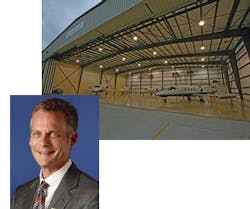Redefining the Business
ADDISON, TX — During his career, Bill Koch has headed up the AMR Combs chain of fixed base operators, which also had a nationwide charter fleet, and more recently served as president and COO of Seven Bar Enterprises, Inc., a mini-chain of FBOs in the Southwest with a strong air ambulance affiliate. In April, Koch was named president and CEO of Imaginaire Private Jet Charter, an aircraft management and FAR Part 135 charter operator based at the Addison Municipal Airport. As is the case with most business aviation companies today, Imaginaire has seen its business activity drop by a third over the past year, according to Koch. The dramatic flip in activity has led officials to rethink the company’s business model, which had been heavily reliant on serving national charter and fractional providers. The orientation today is more localized, with an eye toward investing in the company to position itself for the economic turnaround which officials here are convinced will come in time.
Comments Koch, “Any business is concerned when it has a large concentration on one category of customer; we’re looking for more diversity. That’s what we’re aiming toward.
“We’re profitable; stable; and making long-term investments for the future. Those were the key criteria that were important to me when I came on board and invested in the company.”
Koch is a former chair of the National Air Transportation Association and serves on the executive committee of the Board of Governors for the Air Charter Safety Foundation. He is also on the board of directors for the Frontiers of Flight Museum at Dallas Love Field.
He is teaming up with Jon Maxfield, Imaginaire’s director of sales and marketing, to reposition and market the company for its new mission.
Explains Maxfield, “Being able to build a business plan around supporting the fractionals and being a wholesale supplier — four or five years ago you build a whole plan around just supporting that. Now, you have to build a plan that focuses more on the retail customer.
“In the next three or four years I think there will be a correction in the amount of wholesale charter brokers that are out there. A lot have popped up, many operating from a one- or two-person locations. There’s not enough to go around.
“I think it’s important for retail customers to align themselves with a major operator in the area.”
The goal, they say, is to re-create a company that has a customer base that is two-thirds more local, with the other third coming from the company’s traditional base of fractionals and national network charter providers.
“Charter today is more a national market than it was in the past,” says Koch. “So, we recognize that there are these firms that have a national client base, and we’re happy to serve them.
What we do best is high-level, personalized service. Our customers get used to using this facility; they drive through the gate, go directly to their airplane, they take off, their car gets put away.
“Our clientele like using an airplane they know, one that’s from the staple of airplanes right here in the hangar. They know who owns the airplane; they know the people who fly the airplane, and you’d be surprised how many of them really care about who’s maintaining the airplane – the kind of care and maintenance that we’re providing.
“Even if they’re relatively new to charter, we take them through the maintenance shop. We can tell if these are people who care, and that’s the kind of clientele that Imaginaire intends to serve.”
Besides aircraft management and charter, Imaginaire is heavily into maintenance for the line of aircraft it currently serves — small and medium jets. Koch says the intent is to move into higher end jets and turboprops to offer a wider array of capabilities, even looking to add an Embraer Phenom very light jet in the future.
The company has made the necessary cuts internally in concert with the one-third drop in revenues in recent times. Imaginaire expects to have revenues of some $6 million this year.
Koch and Maxfield both relate that much of the charter market changed overnight, as many of the new users have exited the marketplace.
Says Koch, “It is amazing to me how quickly charter expanded and grew in the past five years. It has a much broader audience. The general flying public would tend to go to Google to find an airplane. They’d find a Learjet to go from Dallas to Las Vegas and what would often pop up is a marketing organization. You don’t know what you’re going to get. What are their standards? Who is flying the airplane?”
Adds Maxfield, “We believe there’s a significant opportunity for traditional Part 91 operators to look for ways to offset their expenses more, maybe where they wouldn’t have in the past. I think we’re in a good position for that. With charter, when the economy goes up or down, charter tends to benefit either way because you tend to get a lot of people who move up from first class to charter when the economy is going up; when it’s going down, you tend to see a lot of flight departments look to charter. We think we’re in a stable position.”
The company also has aircraft based in Ft. Worth and Austin, and Koch expects it to expand its scope as more aircraft are brought on under its aircraft management umbrella. The target: the economic turnaround.
